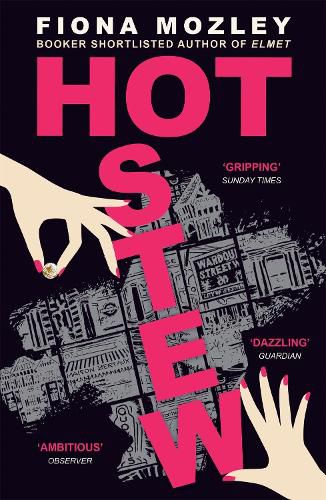Readings Newsletter
Become a Readings Member to make your shopping experience even easier.
Sign in or sign up for free!
You’re not far away from qualifying for FREE standard shipping within Australia
You’ve qualified for FREE standard shipping within Australia
The cart is loading…






‘Did you know in Tudor times all the brothels were south of the river in Southwark and it was only much later that they moved up this way to Soho. Stews, they were called then.’
Pungent, steamy, insatiable Soho; the only part of London that truly never sleeps. Tourists dawdling, chancers skulking, addicts shuffling, sex workers strutting, punters prowling, businessmen striding, the homeless and the lost. Down Wardour Street, ducking onto Dean Street, sweeping into L'Escargot, darting down quiet back alleyways, skirting dumpsters and drunks, emerging on to raucous main roads, fizzing with energy and riotous with life.
On a corner, sits a large townhouse, the same as all its neighbours. But this building hosts a teeming throng of rich and poor, full from the basement right up to the roof terrace. Precious and Tabitha call the top floors their home but it’s under threat; its billionaire-owner Agatha wants to kick the women out to build expensive restaurants and luxury flats. Men like Robert, who visit the brothel, will have to go elsewhere. Those like Cheryl, who sleep in the basement, will have to find somewhere else to hide after dark. But the women won’t go quietly. Soho is their turf and they are ready for a fight.
$9.00 standard shipping within Australia
FREE standard shipping within Australia for orders over $100.00
Express & International shipping calculated at checkout
‘Did you know in Tudor times all the brothels were south of the river in Southwark and it was only much later that they moved up this way to Soho. Stews, they were called then.’
Pungent, steamy, insatiable Soho; the only part of London that truly never sleeps. Tourists dawdling, chancers skulking, addicts shuffling, sex workers strutting, punters prowling, businessmen striding, the homeless and the lost. Down Wardour Street, ducking onto Dean Street, sweeping into L'Escargot, darting down quiet back alleyways, skirting dumpsters and drunks, emerging on to raucous main roads, fizzing with energy and riotous with life.
On a corner, sits a large townhouse, the same as all its neighbours. But this building hosts a teeming throng of rich and poor, full from the basement right up to the roof terrace. Precious and Tabitha call the top floors their home but it’s under threat; its billionaire-owner Agatha wants to kick the women out to build expensive restaurants and luxury flats. Men like Robert, who visit the brothel, will have to go elsewhere. Those like Cheryl, who sleep in the basement, will have to find somewhere else to hide after dark. But the women won’t go quietly. Soho is their turf and they are ready for a fight.
‘And I’m just fed up with the hypocrisy. People have sex for loads of different reasons. And, well, we have sex for money.’
Precious didn’t ask to be the figurehead of a movement. But when the brothel where she lives and works is under threat of demolishment from its billionaire owner, she has no choice but to stand up against the gentrification that is rapidly changing her Soho community. Precious’s livelihood (and the livelihood of the women she lives with) isn’t the only thing at stake. The brothel is the centre of a neighbourhood composed of dying restaurants, struggling artists and activists, people experiencing homelessness and drug addiction, and men with dark pasts who populate the run-down pubs nearby.
Fiona Mozley has crafted a novel that is Dickensian in scope but without all the exhaustive (and exhausting) detail. Hot Stew is populated by a broad cast of instantly memorable characters ranging across the entirety of the social spectrum. This Soho is a bustling, dirty, exciting, seedy and, at moments, fantastical place. It is a much more intriguing portrayal of the infamous London city sector than I personally remember – the Soho I worked near during 2014–2016 seemed to mostly consist of themed cocktail bars and farm-to-table vegan restaurants.
Is it possible to be shortlisted for the Booker Prize and still be underrated? Mozley has fashioned a completely different story here to her 2017 Booker-nominated debut Elmet. I can only hope that she will continue this trajectory of constantly reinventing herself and her writing, reimagining what contemporary fiction can and should do. She deserves a much larger readership.